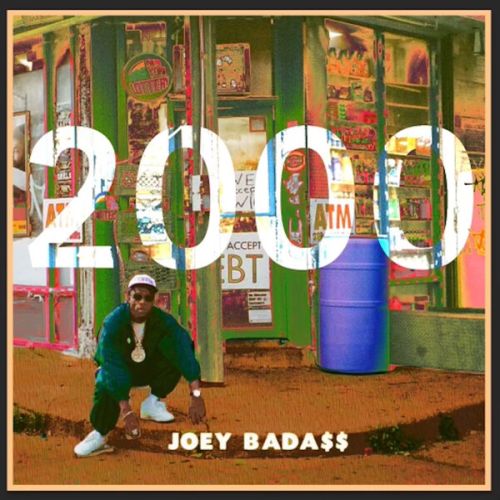“I can take five years off because my s*** is timeless”
I can appreciate “2000” being only Joey Badass’ third studio album, considering he’s only been around for a decade, but I secretly enjoy the fact a modern rapper has a small, but strong discography. “1999” (2012) is highly regarded as a great mixtape of the blog era in hip-hop, while his debut album (2015’s “B4Da$$”) will age well thanks to a combination of sharp writing and timeless production from DJ Premier and Statik Selektah. I was less keen on Joey’s last album “All-AmeriKKKan Bada$$” and Patrick’s review echoed these sentiments – it was a bold exercise for a 22-year-old to make a political album but it fell short both conceptually and musically. The new album then, “2000”, is billed as a sequel to his mixtape “1999” to signify this is a return to form, but also to highlight any growth Joey has undergone in the last five years. The fact he appeared in an Oscar-winning short film in 2020 confirms he didn’t really take five years off.
Similar to most albums released in today’s environment, Joey’s latest had some mild fanfare then slipped into the background during a busy release schedule for hip-hop music. And it’s a shame, because much like the year it cites, “2000” is very much worth celebrating. Much of the production is handled by Statik Selektah, now a veteran with a strong reputation who regularly works with Joey and it’s his sample-flipping in particular that makes this album stand out. The soulfulness of the Stephanie Mills sample on “Make Me Feel” and Times 3’s “Make Up Your Mind” on “One of Us” evoke an 80s atmosphere giving the record a wistful charm that invokes nostalgia that’s slightly different from your usual 1990s boom-bap revivalism. Even the modern “Show Me How” by Men I Trust is flipped brilliantly by Statik.
There is variety on display that is semi-successful: “Cruise Control” sounds like a Drake track, which given it’s produced by Mike Will Made It shouldn’t come as a surprise, but it’s Joey’s vocal inflections that lean dangerously into an impersonation of Toronto’s biggest export that is its ultimate shortcoming. The Chris Brown appearance on “Welcome Back” is perfectly serviceable, but like a lot of lone R&B guest vocalists, still feels shoehorned in as a box-ticking exercise. Do rappers still operate by the “track for the club, track for the streets, track for the ladies” tracklisting model? Maybe I’ve listened to too much music over the years, but this bass-driven number clashes with the tougher instrumentals that make up the rest of the album.
The lead single feels quintessentially on-brand for Joey Bada$$:
It’s wild to consider a 27-year old emcee mature, but with what Joey has achieved and experienced at a young age, it shouldn’t be surprising to hear more somber moments on songs like “Eulogy” (even with Statik providing snares that hit harder than Tyson in an 18-wheeler with no brakes). Legacy is a recurring theme, with this track touching on family loss as well as distrust for the music industry, but it’s “Survivors Guilt” that sees Joey pull the curtain back on how he feels in the years since the death of Pro Era comrade Capital Steez.
As strong as Statik’s showing is, Chuck Strangers comes through with two gems too. Westside Gunn’s sound effects are all over “Brand New 911” and it screams Griselda without feeling out of place, but it’s “Wanna Be Loved” with JID that stands out as one of the album’s shining lights. JID is on a wild run right now and he lends a dynamic to the song that actually reminds the listener Joey’s style of storytelling isn’t at the level of a JID – this is basically a JID track featuring Joey. This is perfectly fine, because at the end of the day, the winner is the listener, but it does confirm Joey’s more mature approach to making music. Each of the features here feels specifically selected for a vision, rather than earlier albums where it was just rappers brought in to spit a sixteen-bar verse.
At 27, Joey Bada$$ has accomplished a lot already. Guru had just founded Gang Starr and Chuck D was readying Public Enemy’s debut album at his age, so it remains jarring just how young he is. With the acting, his path is more in line with LL Cool J, who also began his career as a teenager, but Joey definitely leans more into album music as opposed to LL’s memorable single-driven early career. There’s no “Rock the Bells”, “I’m Bad” or “Mama Said Knock You Out” moment here that cuts through whilst being traditionally New York in its aesthetic. And that’s perhaps what hinders Joey from being in the same bracket as a Kendrick or Cole (who he places himself aside on the opener “The Baddest”), but Joey still offers something different that few artists of his generation can do.

